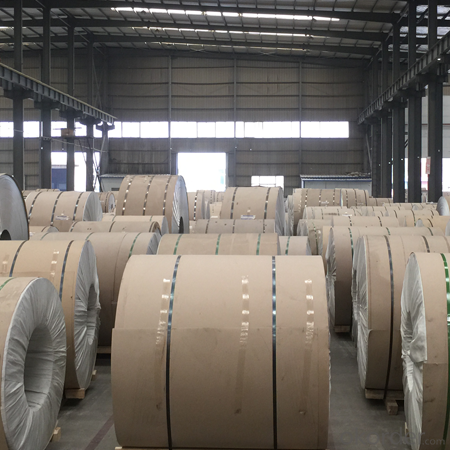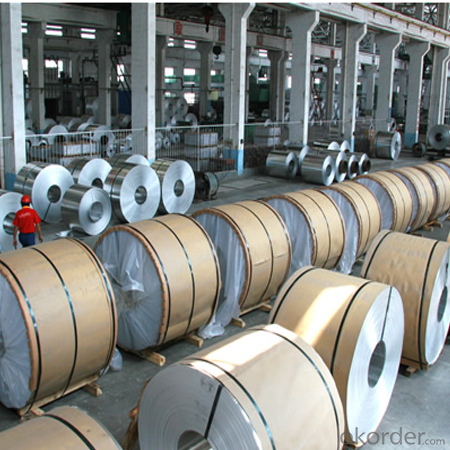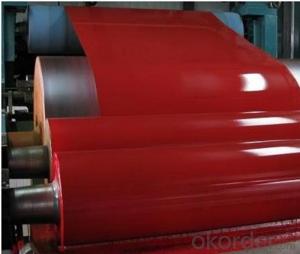Coated Aluminium Coil/Roll For Solar Panel
- Loading Port:
- Shanghai
- Payment Terms:
- TT OR LC
- Min Order Qty:
- 2 m.t.
- Supply Capability:
- 60000 m.t./month
OKorder Service Pledge
OKorder Financial Service
You Might Also Like
Item specifice
Coated Aluminium Coil/Roll For Solar Panel
Description
Alloy | 1060, 1100, 3003, 8011, etc. |
Temper | H16, H18, H24, H26, H28 |
Thickness | From 0.05mm to 3.0mm |
Width | Standard width:1240mm |
Special width:1300mm, 1520mm, 1570mm, 1595mm | |
Diameter | Standard dia:1200mm |
Interior dia:150mm,405mm,505mm | |
Weight | 2.5 T/coil,3.0 T/coil |
Coating | PE, PVDF, ACRYLIC |
Surface | Embossed, mill finish, coated |
Color | AS to code RAL |
Gloss | 10-90%(EN ISO-2813:1994) |
Coating Thickness | PE: more than 18 micron |
PVDF: more than 25 micron | |
Coating Hardness(pencil resistance) | More than 2h |
Coating adhesion | 5J (EN ISO-2409:1994) |
Impact Resistance | No peeling or cracking(50 kg/cm,ASTMD-2794:1993) |
Flexibility(T-bend) | 2T |
MEK resistance | More than 100 |
Advantage | 1.High temperature resistant 2.Weathering resistant 3.Scrubbing resistant 5.Acid or alkali proof 6. Fireproof 7.Light weight material is easy to construct and install |
Out package | Wooden splint with export standard |
Application | ACP, wall cladding, facades, roofs and canopies, ceilings, signboards, blind window, display platforms, electrical panels, etc |


Manufacturing
Decoiler → Accumulator →Tension Leveler →Acid & Alkali Cleaner → Rinse →Conversion Treatment → Priming coater →Infrared Curing Oven →Main coater →Floatation Curing Oven →Strippable Film Applicator → Exit Accumulator → Recoiler
FAQ
--Q: Do you provide free samples?
--A: Yes, free samples will be sent to you on freight at destination.
--Q: Can I get your latest products catalogue?
--A: Yes, it will be sent to you in no time.
--Q: What is the MOQ?
--A: 2 tons
--Q: What are your payment terms?
--A: We accept L/C, T/T.
--Q: What kinds of alloy can you supply?
--A: 1000 series: 1050, 1060, 1070, 1100, 1145, 1200
3000 series: 3003, 3004, 3105, 3104
5000 series: 5052, 5083, 5754, 5182
6000 series: 6061, 6063, 6062, 6063
8000 series: 8011, 8021
--Q: What kinds of temper can you supply?
--A: O-H112: O,H12,H14,H16,H18,H22,H24,H26,H,32,H34,H111,H112
T3, T4, T6
- Q:Are aluminum coils suitable for food and beverage packaging?
- Food and beverage packaging can indeed utilize aluminum coils. Aluminum, being a versatile material, offers numerous advantages for packaging purposes. Its lightweight nature makes transportation and handling a breeze. Furthermore, its exceptional resistance to corrosion ensures that the packaging remains intact, safeguarding the contents from external elements. Additionally, aluminum boasts excellent thermal conductivity, enabling efficient heat transfer, which proves advantageous for temperature-sensitive food and beverage items. Moreover, it acts as a formidable barrier, impermeable to light, moisture, and oxygen, thereby maintaining the quality and freshness of the packaged goods. Furthermore, aluminum's recyclability and reusability make it an environmentally friendly choice for packaging. Consequently, aluminum coils emerge as a dependable and fitting option for food and beverage packaging, courtesy of their durability, protective properties, and sustainability.
- Q:Can aluminum coils be used in the production of heat exchangers?
- Yes, aluminum coils can be used in the production of heat exchangers. Aluminum is a popular choice for heat exchangers due to its excellent thermal conductivity, which allows for efficient heat transfer. Additionally, aluminum is lightweight and corrosion-resistant, making it a durable and long-lasting option for heat exchanger applications. The use of aluminum coils in heat exchangers is common in various industries, including HVAC, refrigeration, automotive, and aerospace.
- Q:Are aluminum coils suitable for low-maintenance applications?
- Indeed, low-maintenance applications are well-suited for the use of aluminum coils. Renowned for its strength and ability to resist corrosion, aluminum proves to be an exceptional selection for applications that demand minimal upkeep. Unlike alternative materials like steel, aluminum coils remain free from rust and do not necessitate regular painting to preserve their aesthetic appeal. Furthermore, the lightweight nature of aluminum facilitates effortless installation and handling, particularly in low-maintenance scenarios where frequent maintenance may prove impractical or undesirable. Ultimately, aluminum coils serve as a dependable and low-maintenance solution for a range of applications.
- Q:Are aluminum coils suitable for HVAC systems?
- Yes, aluminum coils are suitable for HVAC systems. They offer several advantages such as corrosion resistance, lightweight construction, and efficient heat transfer, making them a popular choice for cooling and heating applications in HVAC systems.
- Q:Hey! I have an Aluminum MacBook (2.4 GHz Core 2 Duo, 9400m graphics processor), and I'm wondering whether it's worth updating to the new 2011 13 MacBook Pro. I'm mainly looking for two things: 1. What would be the difference between the 2.4 GHz Core 2 Duo, and the 2.3 GHz i5, and 2. What would be the difference between the 9400m and the HD 3000 Graphics?Thanks! :)
- THIS ONE IS BEST ACCORDING TO YOUR REQUIREMENT Apple MacBook Pro MC700LL/A 13.3-Inch Laptop *13.3-inch LED-backlit glossy widescreen display with edge-to-edge, uninterrupted glass (1280 x 800-pixel resolution). *2.3 GHz Intel Core i5 dual-core processor (Sandy Bridge) with 3 MB shared L3 cache for excellent multitasking. *Intel HD Graphics 3000 with 384 MB of DDR3 SDRAM shared with main memory. *320 GB Serial ATA hard drive (5400 RPM) *4 GB installed RAM (1333 MHz DDR3; supports up to 8 GB) *8x slot-loading SuperDrive with double-layer DVD support (DVD±R DL/DVD±RW/CD-RW) *Built-in FaceTime HD camera for video chatting *Wi-Fi wireless networking (based on 802.11n specification; 802.11a/b/g compatible) *Gigabit Ethernet wired networking (10/100/1000) *Bluetooth 2.1 + EDR (Enhanced Data Rate) for connecting with peripherals such as keyboards, mice and cell phones *Two USB 2.0 ports, one FireWire 800 port *SDXC card slot *Thunderbolt port with native Mini DisplayPort output plus support for DVI, VGA, dual-link DVI, and HDMI (requires adapters, sold separately) *Multi-Touch trackpad for precise cursor control with support for inertial scrolling, pinch, rotate, swipe, three-finger swipe, four-finger swipe, tap, double-tap, and drag capabilities *Full-size backlit keyboard *Stereo speakers with subwoofers *Dimensions: 12.78 x 8.94 x 0.95 inches (WxDxH) *Weight: 4.5 pounds *Up to 7 hours of battery life *Meets Energy Star 5.0 requirements *Rated EPEAT Gold
- Q:What is the role of aluminum coils in HVAC systems?
- The functioning of HVAC systems relies heavily on the presence of aluminum coils, which are vital for system efficiency. Within the air conditioning unit, aluminum coils serve as a crucial component responsible for the transfer of heat between indoor and outdoor environments. When the air conditioning unit operates in cooling mode, the aluminum coils serve as evaporator coils. Their primary function is to absorb heat from the indoor air, resulting in its cooling. The warm air from the room passes over the cold aluminum coils, and the heat is then transferred to the refrigerant flowing through the coils. This process effectively cools the air while removing moisture, ultimately achieving the desired cooling effect. In heating mode, the aluminum coils take on the role of condenser coils. They receive the hot refrigerant from the compressor and proceed to transfer the heat to the surrounding air. This hot air is then circulated throughout the building, providing warmth during colder weather. Aluminum coils are preferred in HVAC systems due to their exceptional heat transfer properties and resistance to corrosion. These coils are lightweight, durable, and possess high thermal conductivity, enabling efficient heat exchange. Additionally, aluminum coils are more environmentally friendly compared to other materials like copper, as they are easier to recycle. Regular maintenance and cleaning of the aluminum coils are essential to ensure optimal performance and prevent any potential airflow restrictions caused by the accumulation of dust, dirt, or debris. Neglecting coil maintenance can result in reduced cooling or heating capacity, decreased energy efficiency, and even system breakdowns. Overall, the significance of aluminum coils in HVAC systems cannot be overstated. These coils play a vital role in facilitating the heat transfer process, enabling efficient temperature control in both cooling and heating modes, and contributing to the overall comfort and functionality of the system.
- Q:What is the maximum yield strength of aluminum coils?
- The specific alloy and temper of aluminum significantly influence the maximum yield strength of aluminum coils. Typically, aluminum coils exhibit a yield strength between 10,000 and 40,000 psi. It must be emphasized that diverse properties and, consequently, varying maximum yield strengths are observed in different aluminum alloys and tempers. Furthermore, the thickness and width of aluminum coils have an impact on their maximum yield strength as well. Thus, to ascertain the precise maximum yield strength of aluminum coils, it is advisable to refer to the manufacturer's specifications or standards pertaining to the specific alloy and temper of the coils.
- Q:I want to make arrows for my bow that making, i have an idea of making a wooden mold and then finding the melting point of aluminum foil and melt it, prob is that i dont have anything to melt it with my moms oven goes up to only 500F and i need one up to 1240F
- Its relatively viable to soften aluminum foil. The Adiabatic temperature of a traditional gasoline flame is 1950C. The oven backside is in shut proximity to the flame so its temp will likely be a lot hotter than the air temp of the oven. Although you consider simplest half of this temperature to account for other temperature losses you are still 300C over the melting temp. While you first activate the oven the flame get turned on at a max price and stays on except the oven warms up. Because of this the backside of the oven will get much hotter than the oven environment. Remember shopping a substitute phase for the detachable oven backside alternatively of an complete oven. You could additionally are trying taking away the backside taking it outside and use a propane torch to remelt the aluminum and wipe it off with a bit of steel wool once its softened up.
- Q:Are there any limitations to the maximum coil length of aluminum coils?
- The maximum length of aluminum coils is subject to certain limitations. Factors that affect the maximum coil length include the thickness and width of the coil, the strength and tensile properties of the aluminum alloy, the equipment used for coil processing, and the intended application of the coil. One limitation is the strength and ductility of the aluminum alloy. Aluminum alloys with higher strength and lower ductility may have restrictions on the maximum coil length due to the risk of coil breakage or deformation during processing or handling. Another limitation is the coil processing equipment. The maximum coil length is often determined by the size and capabilities of the equipment used for slitting, cutting, or forming the coils. If the equipment has limited capacity or is not designed for longer coils, it may not be able to effectively handle or process longer lengths. The intended application of the coil can also impose limitations. For example, in the automotive industry, there may be restrictions on the maximum coil length based on the size and weight limitations of the vehicles. Moreover, logistical factors such as transportation and storage can also impose limitations. Longer coils may be more challenging to handle, transport, and store, which can increase the risk of damage or pose challenges in terms of logistics and space requirements. Therefore, it is crucial to consider various factors such as alloy properties, equipment capabilities, application requirements, and logistical considerations to determine the practical limitations of coil length for a specific situation, as there is no specific universal limit to the maximum coil length of aluminum coils.
- Q:What are the storage life and shelf life of aluminum coils?
- The storage life and shelf life of aluminum coils can vary depending on various factors such as the storage conditions and the specific type of aluminum alloy used. Generally, aluminum coils have a relatively long storage life and shelf life. In terms of storage life, aluminum coils can be stored for an extended period of time without significant degradation in their quality or performance. However, it is important to store them in a dry and well-ventilated area to prevent corrosion. Moisture can cause oxidation and corrosion, which can affect the integrity and durability of the aluminum coils. As for the shelf life, aluminum coils can remain in good condition and retain their functional properties for an extended period of time when stored properly. The exact shelf life will depend on the specific application and the intended use of the aluminum coils. To ensure the longevity of aluminum coils, it is recommended to follow the manufacturer's guidelines for storage and handling. Additionally, regular inspections and maintenance can help identify any signs of corrosion or damage and take appropriate measures to prevent further deterioration.
1. Manufacturer Overview |
|
|---|---|
| Location | |
| Year Established | |
| Annual Output Value | |
| Main Markets | |
| Company Certifications | |
2. Manufacturer Certificates |
|
|---|---|
| a) Certification Name | |
| Range | |
| Reference | |
| Validity Period | |
3. Manufacturer Capability |
|
|---|---|
| a)Trade Capacity | |
| Nearest Port | |
| Export Percentage | |
| No.of Employees in Trade Department | |
| Language Spoken: | |
| b)Factory Information | |
| Factory Size: | |
| No. of Production Lines | |
| Contract Manufacturing | |
| Product Price Range | |
Send your message to us
Coated Aluminium Coil/Roll For Solar Panel
- Loading Port:
- Shanghai
- Payment Terms:
- TT OR LC
- Min Order Qty:
- 2 m.t.
- Supply Capability:
- 60000 m.t./month
OKorder Service Pledge
OKorder Financial Service
Similar products
New products
Hot products
Related keywords




























